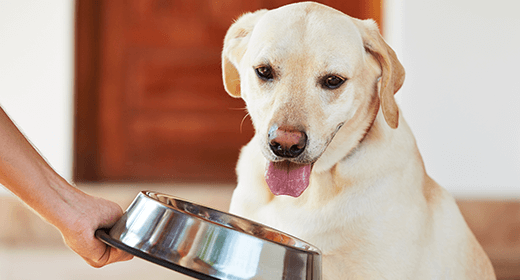

Fiber is important to your dog's health, providing bulk to move food through his intestinal tract. Some types of fiber can be fermented (broken down by bacteria) in the intestinal tract. This process creates short-chain fatty acids (SCFA), which are a key energy source for the cells lining the intestinal tract.
Most people are aware of fiber and its role in their diet. The beneficial effects of higher fiber levels in humans influence the way many people think about their own food—and their pets’ food. As a result, some pet-food manufacturers began to think like human nutritionists and make high-fiber diets for dogs. But high-fiber diets and the shorter digestive tracts of dogs don't always mix well. High fiber levels in dogs can cause digestive problems and interfere with proper nutrient absorption. Unlike humans, dogs are carnivorous, meaning their nutritional needs are better satisfied with meat rather than with plant materials.
For more than 60 years, pet nutritionists at IAMS™ have been studying diets to better meet the special nutritional needs of dogs. IAMS research shows that the optimal crude-fiber level for healthy dogs ranges from 1.4 to 3.5%. At these levels, nutrient digestibility is maximized.
An important characteristic of fiber is its fermentability, or how well it can be broken down by the bacteria that normally reside in the dog's intestine. This breakdown of dietary fiber produces SCFAs that provide energy to the cells lining the intestines. Different types of fiber vary in fermentability.
Fiber sources used in pet foods include cellulose, which is poorly fermentable; beet pulp, which is moderately fermentable; and gums and pectin, which can be highly fermentable.
Research has shown that moderate levels of moderately fermentable fiber, such as beet pulp, provide the benefits of energy for the intestinal lining and bulk without the negative effects of excessive stool or gas.
High levels of poorly fermentable fiber are used in some weight-reduction pet foods to dilute the calories in a serving. IAMS research found that this is not a good practice because high fiber levels can decrease the digestibility of other nutrients in the food and, therefore, can reduce the nutritional quality of the diet. You might also see more poop piles in the yard because of the indigestible fiber.
The key thing to remember about dietary fiber is that your dog's needs are not the same as yours. A moderate level of moderately fermentable fiber, such as beet pulp, provides proven nutritional benefits for dogs. Diets containing high levels of poorly fermentable fiber to dilute calorie content do not provide these nutritional benefits.
All IAMS products, including IAMS™ ProActive Health™ Adult MiniChunks, are formulated with optimal levels of moderately fermentable fiber to promote a healthy intestinal tract and enhance the well-being of your dog.


So as a pet parent, how do you make sure your Lab is eating well-rounded meals? One way to do that is to find dog food that is tailored to suit the Labrador diet. The best dog food for Labrador Retrievers will always contain the following elements…
Labrador food should always include lean and quality proteins from sources like poultry to help strengthen and maintain their muscles.
Ingredients like beet pulp, corn, wheat, barley and maize are not only packed with nutrients but they also aid digestion. Labrador food that contains digestible ingredients helps when it comes to supporting a healthy gut.
Moderate and controlled amounts of fat in addition to Omega 6 and 3 fatty acids are necessary to support a healthy coat as well as healthy skin. These ingredients are important for Labradors to ensure they do not suffer from issues like flaky and itchy skin.
Labrador Retrievers are susceptible to obesity. Therefore, an important supplement to look for in Labrador food is L-Carnitine. L-Carnitine is known to help with metabolism and also supports healthy weight management.
Labradors are fun, playful and active dogs. To facilitate these characteristics, the labrador diet must consist of supplements like Glucosamine and Chondroitin Sulphate that support healthy joints.
If you’re looking for dog food that is specific to the Labrador diet, IAMS™ Labrador Retriever dog food will not let you down. It is a premium-tailored recipe that contains all the ingredients that support the unique nutritional requirements of a Labrador Retriever. By switching to this dog food, you are ensuring your Lab is at its healthiest and best, always!
